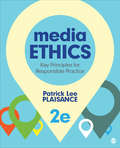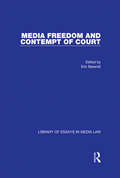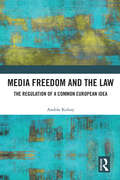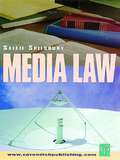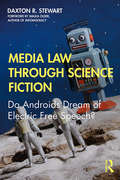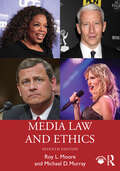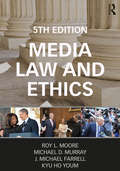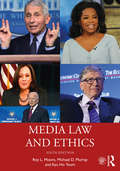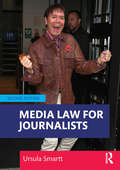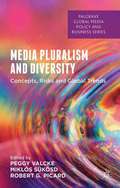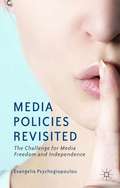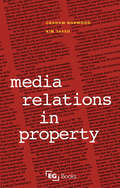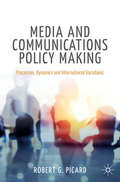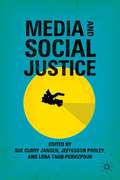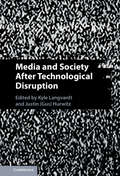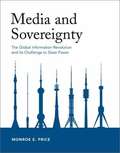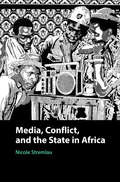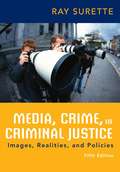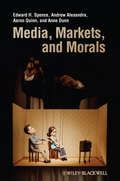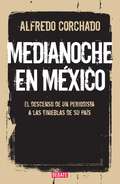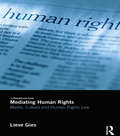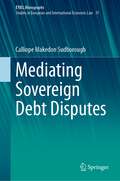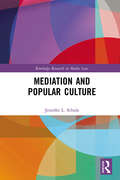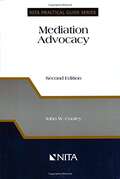- Table View
- List View
Media Ethics: Key Principles for Responsible Practice
by Patrick L. PlaisanceMedia Ethics: Key Principles for Responsible Practice makes ethics accessible and applicable to media practice, and explains key ethical principles and their application in print and broadcast journalism, public relations, advertising, marketing, and digital media. Unlike application-oriented casebooks, this text sets forth the philosophical underpinnings of key principles and explains how each should guide responsible media behavior. Author Patrick Lee Plaisance synthesizes classical and contemporary ethics in an accessible way to help students ask the right questions and develop their critical reasoning skills, as both media consumers and media professionals of the future. The Second Edition includes new examples and case studies, expanded coverage of digital media, and two new chapters that distinguish the three major frameworks of media ethics and explore the discipline across new media platforms, including blogs, new forms of digital journalism, and social networking sites.
Media Freedom and Contempt of Court (Library Of Essays In Media Law Ser.)
by Eric BarendtThe essays discuss the restrictions imposed by contempt of court and other laws on media freedom to attend and report legal proceedings. Part I contains leading articles on the open justice principle. They examine the extent to which departures from that principle should be allowed to protect the rights of parties, in particular the accused in criminal proceedings, to a fair trial, and their interest in being rehabilitated in society after proceedings have been concluded. The essays in Part II examine the topical issue of whether open justice entails a right to film and broadcast legal proceedings. The articles in Part III are concerned with the application of contempt of court to prejudicial media publicity; they discuss whether it is possible to prevent prejudice without sacrificing media freedom. Another aspect of media freedom and contempt of court is canvassed in Part IV: whether journalists should enjoy a privilege not to reveal their sources of information.
Media Freedom and the Law: The Regulation of a Common European Idea
by András KoltayThe main objectives of media regulation in Europe are to protect media freedom, to ensure the social responsibility of the media, and to prevent harm caused by speech published through the media. This book examines the way in which these are reflected in European legal regimes and jurisprudence at the supranational, regional, and national levels.It addresses the theoretical considerations behind the protection and restriction of media freedom. It starts from the assumption that there is a common European ideal of media freedom as a human right. Apart from EU law, and in many cases similar national regulations, many common points can be identified across Europe in the theoretical underpinnings of this right, and the history of struggles for this freedom in different European countries also shows common features.While the focus is on media freedom in Europe, the work also discusses the uniquely distinct concept of freedom of expression and of the media that is prevalent in the US, the principles of which have a significant impact in Europe. The book uses a comparative method, in part, as it attempts to outline the common regulatory framework for the idea of media freedom on a European scale. The reference to national laws and court decisions is intended to illustrate this picture, looking primarily at what binds European states together.The work will be a valuable resource for those working in the areas of public law, media law, media studies, comparative law, international human rights law, and legal philosophy.
Media Law
by Dr S. R. MyneniThe author determined to write a textbook on Media Law an eminent Journalist about the frame and scheme of the book. The result is the outcome of this volume. The volume is based on the syllabus of Bar Council and different Indian Universities. No textbook writer can claim originality of thought as the author has to explain the prescribed topics based on given references. The reader of this textbook is advised to use this textbook for academic purposes.
Media Law
by Sallie SpilsburyThe aim of this book is to analyse media law in relation to specific areas,both in terms of its practical application and its theoretical framework. Part 1 concentrates on the regulation of media content and is largely written from a pro media point of view. Its central tenet is how far does the English media enjoy freedom of expression and the way in which that impacts on how the media operates. It considers how the Human Rights Act 1998 impacts on the media. Part 2 moves on to look at the regulation of the media industries as a whole. Part 3 focuses on day to day transactions for the media. In particular it focuses on provisions from typical media agreements and aims to provide a context for the law which has been outlined in Parts 1 and 2. The structure of this book bridges the gap between a traditional textbook and practitioner work and provides a book which will be of interest to law degree and LPC students and practitioners.
Media Law Through Science Fiction: Do Androids Dream of Electric Free Speech?
by Daxton R. StewartAttorney and legal scholar Daxton Stewart examines the intersection of media law and science fiction, exploring the past, present, and future of communication technology and policy debates. Science fiction offers a vast array of possibilities anticipating future communication technologies and their implications on human affairs. In this book, Stewart looks at potential legal challenges presented by plausible communication technologies that may arise 20 or 50 or 100 years from today. Performing what he calls "speculative legal research," Stewart identifies the kinds of topics we should be talking about relating to speech, privacy, surveillance, and more, and considers the debates that would be likely to arise if such technologies become a reality. Featuring interviews with prominent science fiction authors and legal scholars, and a foreword by Malka Older, this book considers the speculative solutions of science fiction and their implications in law and policy scholarship. Chapters feature specific literary examples to examine how cultural awareness and policy creation are informed by fictional technology, future societies, and legal disputes. Looking forward, beyond traditional legal research and scholarship to the possible and even very likely future of communication technology, this fascinating work of speculative legal research will give students and scholars of media law, science fiction, and technology much to discuss and debate.
Media Law and Ethics
by Roy L. Moore Michael D. MurrayThis fully revised seventh edition provides a thorough introduction to both the legal and ethical considerations relevant to students pursuing careers in media, law and communication.This comprehensive textbook integrates fundamental legal and ethical principles with cases and examples from both landmark moments and recent history. It incorporates discussion of new technologies and media throughout its coverage of core topics such as intellectual property, defamation and commercial speech. This edition introduces readers to media law in comparative international communication and explores topics such as data mining, artificial intelligence and the dark web. Coverage of recent court cases and congressional hearings bring readers up to date on the evolving discussion surrounding Facebook, X (formerly Twitter), TikTok and today’s other major online sources.This hybrid textbook is ideal for undergraduate and graduate courses in media and communication that combine law and ethics.Online resources, including sample syllabi and a test bank, are available at www.routledge.com/9781032612928.
Media Law and Ethics (Routledge Communication Series)
by Mike Farrell Roy L. Moore Michael D. Murray Kyu Ho YoumMedia Law and Ethics is a comprehensive overview and a thoughtful introduction to media law principles and cases as well as related ethical concerns relevant to the practice of professional communication. This is the fi rst textbook to explicitly integrate both media law and ethics within one volume. Since it integrates both current law and ethical queries, it is ideal for both undergraduate and graduate courses in media law and ethics. Co-author Kyu Ho Youm expands this edition’s international scope, updating and broadening his chapter on international and foreign law. The book also covers the most timely and controversial issues in modern American media. The new fi fth edition has been updated with current events and discusses the potential impact they have.
Media Law and Ethics: A Casebook
by Roy L. Moore Michael D. Murray Kyu Ho YoumThis comprehensive textbook provides a thoughtful introduction to both the legal and ethical considerations relevant to students pursuing careers in communication and media. The fully revised, sixth edition continues to integrate fundamental legal and ethical principles with cases and examples from both landmark moments and recent history. It expands upon the previous edition's exploration of international and non-U.S. law, introduces a new chapter on digital and social media, and incorporates discussion of new technologies and media throughout its coverage of core topics such as privacy, intellectual property, defamation and commercial speech. Coverage of recent court cases and congressional hearings brings readers up to date on the evolving discussion surrounding Facebook, Twitter and today’s other major online players. This hybrid textbook is ideal for undergraduate and graduate courses in media and communication that combine law and ethics. Online resources including chapter PowerPoint slides, study guides and sample teaching materials are available at www.routledge.com/cw/moore
Media Law for Journalists
by Ursula SmarttThis book is both an introductory text and reference guide to the main issues facing journalists today, including social media, fake news, and regulators. The text covers the law of the United Kingdom – including Scots and Northern Irish devolved legislation – as well as human rights and EU laws. This book covers essential areas such as: privacy, confidentiality, freedom of expression and media freedom, defamation, contempt of court, regulation of the print press and broadcast regulation as well as discussions on fake news and how to regulate online harm. There is a section on intellectual property law, covering mainly copyright. Court reporting and how to report on children, young people and victims of sexual offences receive particular attention in this book with relevant cases in user-friendly format. The engaging writing style is aimed to enthuse students, practitioners and lecturers with plenty of examination and practice materials. The text is packed with extensive learning aids including case studies, boxed notes, sample examination questions, appendices of statutes and cases and a glossary. It is intended as a complete course textbook for students and teachers of journalism, media, communications and PR courses, focusing on diploma courses, NCTJ examinations and broadcast journalism courses such as the BJTC. The book’s international focus would also make it ideal reading for journalists from across the world who are working in the UK. The book presumes no prior legal knowledge.
Media Pluralism and Diversity: Concepts, Risks and Global Trends (Palgrave Global Media Policy and Business)
by Robert Picard Peggy Valcke Miklos SukosdAdopting a truly global, theoretical and multidisciplinary perspective, Media Pluralism and Diversity intends to advance our understanding of media pluralism across the globe. It compares metrics that have been developed in different parts of the world to assess levels of, or threats to, media pluralism.
Media Policies Revisited
by Evangelia PsychogiopoulouEvangelia Psychogiopoulou brings together distinguished scholars across a range of academic disciplines to investigate the media's freedom and independence, and the media policy processes, institutional spaces, regulatory practices and instruments that can support the development of free and independent media in Europe.
Media Relations in Property
by Kim Tasso Graham NorwoodMedia relations are a vital tool for helping property companies build shareholder value through stronger brands, develop reputations that drive a flow of new work, and help sell and let properties faster and at a fraction of the cost of other marketing techniques, but such relationships need to be managed properly. This practical and comprehensive book – peppered with real case studies and observations from numerous people within the property industry – aims to demystify ‘the black art of PR’. Some of the topics covered include: the strategic aims and benefits of good media relations promoting good media relations practice throughout your organization an overview of property opportunities across the UK media understanding journalists and what they want do's and don'ts of working with the media developing a media relations plan the costs of media relations programmes. Written by an award winning property journalist and a marketing consultant with more than forty years experience between them, this book is a must read for all property professionals looking to make the most out of the media.
Media and Communications Policy Making: Processes, Dynamics and International Variations (Palgrave Global Media Policy and Business)
by Robert G. PicardThis textbook focuses on how media and communications policy is made and what influences its design. It explores the structures and processes in which policymaking takes place worldwide, the factors that determine its forms, influence its elements, and affect its outcomes. It explores how to analyze policy proposals, evaluate policy, and use policy studies approaches to examine policy and policymaking. Truly international in scope, it lays out the variety of political, social, economic, and institutional influences on policy, the roles of industries and policy advocates in the processes, and issues and factors that complicate effective policymaking and skew policy outcomes. This textbook is a valuable resource for advanced undergraduate and postgraduate students.
Media and Social Justice
by Sue Curry JansenThis book is an anthology of work by critical media scholars, media makers, and activists who are committed to advancing social justice. Topics addressed include but are not limited to international media activist projects such as the Right to Communication movement and its corollaries; the importance of listening and enacting policies that advance democratic media; regional and local media justice projects; explorations of the challenges the era of participatory media pose to public media; youth and minority media projects and activism; ethical dilemmas posed by attempts to democratize access to media tools; the continued marginalization of feminist perspectives in international policy venues; software freedom and intellectual property rights; video activism in both historical and contemporary contexts; internet strategies for defending dissenting voices; and five accounts by prominent scholar/activists of their lifelong struggles for media justice.
Media and Society After Technological Disruption
by Kyle Langvardt Gus HurwitzThe internet has reshaped the media landscape and the social institutions built upon it. Competition from online media sources has decimated local journalism and diminished the twentieth century's established journalistic gatekeepers. Social media puts individual users front and center in the creation of the content that they consume. Harmful speech can spread further and faster, and the institutions responsible for policing that speech-Facebook, TikTok, YouTube and the like-lack any clear twentieth-century analog. The law is still working to catch up to the world these changes have wrought. This volume gathers sixteen scholars in law, media, technology, and history to consider these changes. Chapters explore the breakdown of trust in the media, changes in the law of defamation and privacy, challenges of online content moderation, and financial viability for journalistic enterprises in the internet age. This title is also available as Open Access on Cambridge Core.
Media and Sovereignty: The Global Information Revolution and Its Challenge to State Power
by Monroe E. PriceHonorable Mention for the 2002 Communication Policy Research Award presented by The Donald McGannon Communication Research Center. Media have been central to government efforts to reinforce sovereignty and define national identity, but globalization is fundamentally altering media practices, institutions, and content. More than the activities of large conglomerates, globalization entails competition among states as well as private entities to dominate the world's consciousness. Changes in formal and informal rules, in addition to technological innovation, affect the growth and survival or decline of governments. In Media and Sovereignty, Monroe Price focuses on emerging foreign policies that govern media in a world where war has information as well as military fronts. Price asks how the state, in the face of institutional and technological change, controls the forms of information reaching its citizens. He also provides a framework for analyzing the techniques used by states to influence populations in other states. Price draws on an international array of examples of regulation of media for political ends, including "self-regulation," media regulation in conflict zones, the control of harmful and illegal content, and the use of foreign aid to alter media in target societies.
Media, Conflict, and the State in Africa
by Nicole StremlauCountries emerging from violent conflict face difficult challenges about what the role of media should be in political transitions, particularly when attempting to build a new state and balance a difficult legacy. Media, Conflict, and the State in Africa discusses how ideas, institutions and interests have shaped media systems in some of Africa's most complex state and nation-building projects. This timely book comes at a turbulent moment in global politics as waves of populist protests gain traction, and concerns continue to grow about fake news, social media echo chambers, and the increasing role of both traditional and new media in waging wars or influencing elections. Focusing on comparative cases from a historical perspective and the choices and ideas that informed the approaches of some of Africa's leaders, including guerrilla commanders Yoweri Museveni of Uganda and Meles Zenawi of Ethiopia, Nicole Stremlau offers a unique political insight into the development of contemporary media systems in Africa.
Media, Crime, and Criminal Justice (5th Edition)
by Ray Surette<i>Media, Crime, and Criminal Justice</i> is the definitive text on media and criminal justice. The book features impeccable scholarship, a direct and approachable style, and an engaging format--supported by visual examples and sidebar material that complements the narrative. With the ever-increasing role of media in both reporting crime and shaping it into infotainment, the importance of the interplay between contemporary media and the criminal justice system is greater today than ever before. Author Ray Surette comprehensively surveys this interplay and showcases its impact, emphasizing that people use media-provided knowledge to construct a picture of the world and then act based on this constructed reality.
Media, Markets, and Morals
by Edward H. Spence Anne Dunn Andrew Alexandra Aaron QuinnMedia, Markets, and Morals provides an original ethical framework designed specifically for evaluating ethical issues in the media, including new media. The authors apply their account of the moral role of the media, in their dual capacity as information providers for the public good and as businesses run for profit, to specific morally problematic practices and question how ethical behavior can be promoted within the industry. Brings together experts in the fields of media studies and media ethics, information ethics, and professional ethics Offers an original ethical framework designed specifically for evaluating ethical issues in the media, including new media Builds upon and further develops an innovative theoretical model for examining and evaluating media corruption and methods of media anti-corruption previously developed by authors Spence and Quinn Discloses and clarifies the inherent ethical nature of information and its communication to which the media as providers of information are necessarily committed
Medianoche en México: El descenso de un periodista a las tinieblas de un país en guerra
by Alfredo CorchadoUn periodista sigue la pista de diversos cárteles de la droga en México, hasta que su propia vida es puesta en predicamento. Es medianoche en México, 2007. Alfredo Corchado recibe una llamada telefónica de su fuente principal para informarle que hay un plan para asesinarlo por parte de un poderoso capo. Pronto averigua que lo quieren matar porque uno de sus artículos en el Dallas Morning News afectó los sobornos que los narcotraficantes entregan a policías, militares y funcionarios del gobierno mexicano. Así comienza el viaje en espiral de un hombre que busca descifrar la compleja situación del país mientras lucha por salvar su vida. A pesar de recorrer un camino de múltiples encrucijadas, desigualdad y violencia extrema, Corchado, "infectado con la enfermedad incurable del periodismo", no se resigna a abandonar la esperanza en tiempos turbulentos. Ahora, el líder del brutal cártel que lo perseguía, el Z-40, está detenido, pero la historia no haterminado de escribirse. "Este libro habla sobre las sangrientas fronteras que dividen los dos países de Alfredo Corchado -México y Estados Unidos- y que han regido su propia vida. Con el telón de fondo de la terrible y violenta guerra contra las drogas que ha convertido a México en una tierra de sepulcros, Corchado comparte su propia historia y la de su familia de manera conmovedora, honesta y aguda." -JON LEE ANDERSON, autor de Che Guevara, una vida revolucionaria "Un sutil y conmovedor testimonio que servirá a cualquiera que desee entender a México desde sus profundidades y cómo es afectado -legal e ilegalmente- por Estados Unidos." -JOHN WOMACK JR., autor de Rebelión en Chiapas "Alfredo Corchado es el tipo de reportero y escritor que nos hace recuperar la fe en el periodismo." -TRACY KIDDER, Premio Pulitzer, autor de La fuerza de lo que queda
Mediating Human Rights: Media, Culture and Human Rights Law
by Lieve GiesDrawing on social-legal, cultural and media theory, this book is one of the first to examine the media politics of human rights. It examines how the media construct the story of human rights, investigating what lies behind the apparent media hostility to human rights and what has become of the original ambition to establish a human rights culture. The human rights regime has been high on the political agenda ever since the Human Rights Act 1998 was enacted. Often maligned in sections of the press, the legislation has entered popular folklore as shorthand for an overbearing government, an overzealous judiciary and exploitative claimants. This book examines a range of significant factors in the mediation of human rights, including: Euroscepticism, the war on terror, the digital reordering of the media landscape, , press concerns about an emerging privacy law and civil liberties. Mediating Human Rights is a timely exploration of the relationship between law, politics and media. It will be of immense interest to those studying and researching across Law, Media Studies, Human Rights, and Politics.
Mediating Sovereign Debt Disputes (European Yearbook of International Economic Law #35)
by Calliope Makedon SudboroughThis book provides a fresh perspective on resolving sovereign debt disputes within the investor-state mediation framework. In response to the limitations of traditional approaches to adjudicating public debt issues and the resulting gaps in international law concerning sovereign defaults, creditors have increasingly turned to investor-state treaty arbitrations to recover unpaid debts. However, this shift has raised numerous criticisms and concerns.Accordingly, this book explores the uncharted territory of utilizing mediation as a means to settle sovereign debt claims. It sheds light on the distinctive characteristics of mediation as a process, setting it apart from judicial litigation and private arbitration, and emphasizing the unique outcomes it can generate. The central argument of this book is that mediation should be seriously considered as a viable option for resolving sovereign debt disputes. Not only does it offer a more cost-effective and expeditious approach, but it also has the potential to facilitate economic recovery and sustain continued investment.
Mediation & Popular Culture (Routledge Research in Media Law)
by Jennifer L. SchulzThis book examines mediation topics such as impartiality, self-determination and fair outcomes through popular culture lenses. Popular television shows and award-winning films are used as illustrative examples to illuminate under-represented mediation topics such as feelings and expert intuition, conflicts of interest and repeat business, and deception and caucusing. The author also employs research from Australia, Belgium, Canada, China, Denmark, France, Germany, Greece, India, Israel, Japan, the Netherlands, New Zealand, Singapore, South Africa, Spain, the United Kingdom and the United States of America to demonstrate that real and reel mediation may have more in common than we think. How mediation is imagined in popular culture, compared to how professors teach it and how mediators practise it, provides important affective, ethical, legal, personal and pedagogical insights relevant for mediators, lawyers, professors and students, and may even help develop mediator identity.
Mediation Advocacy (Nita Practical Guide Ser.)
by John W. CooleyWritten by a lawyer for lawyers, Mediation Advocacy was critically acclaimed in 1996 for its in-depth examination of the mediation process. Now, six years later, the mediation field has changed dramatically, and John W. Cooley updates this classic text to include a comprehensive chapter on cybermediation as well as new sections on various mediation design processes and techniques. In Mediation Advocacy, Second Edition, Cooley leads you step by step through the stages of mediation.
